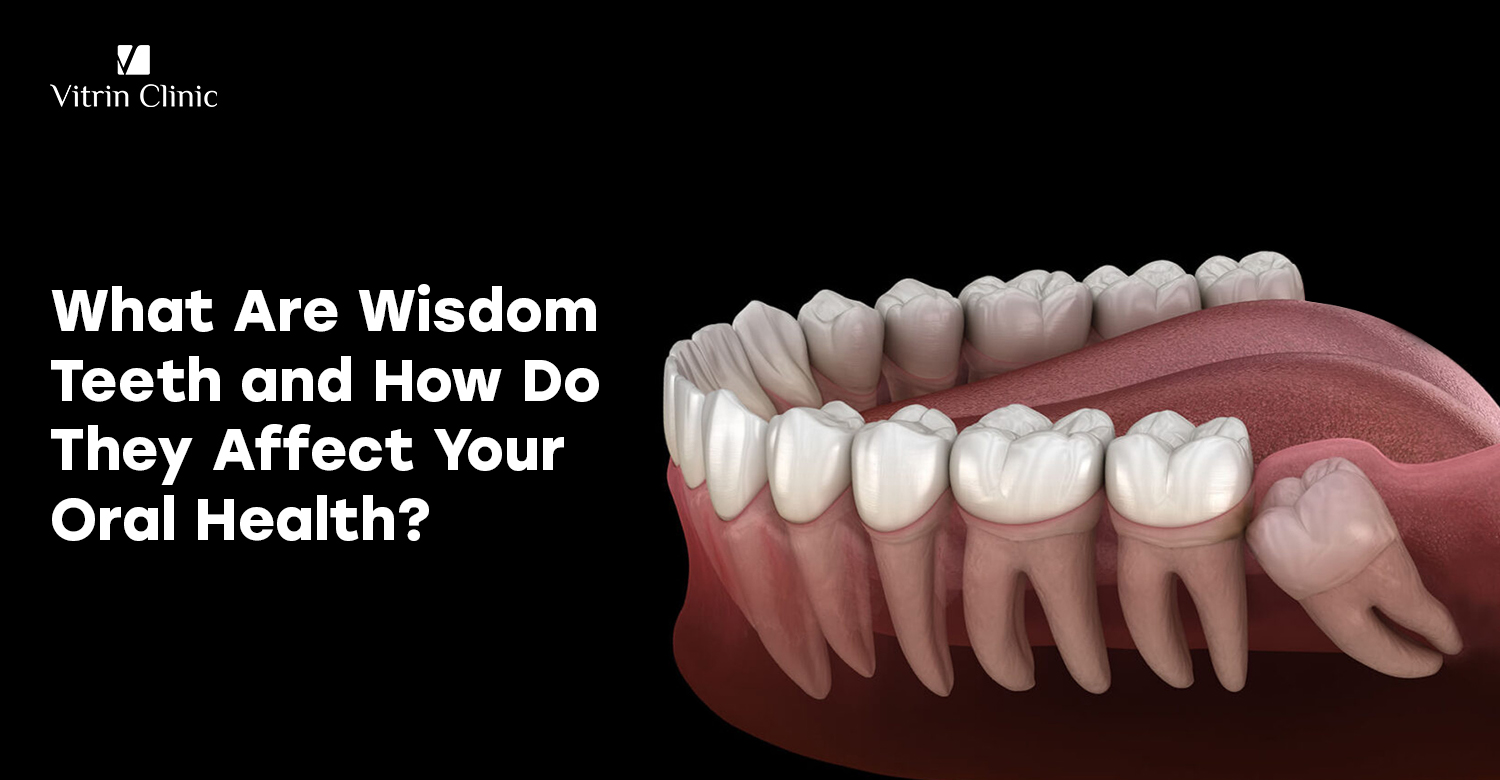What Are Wisdom Tooth?
Wisdom Tooth, also known as third molars, are the last set of molars that usually emerge in your late teens or early twenties. These teeth are located at the back corners of your mouth, and while they can be helpful for chewing, they often cause problems due to lack of space in the jaw.
Why Are They Called Wisdom Tooth?
They’re called “wisdom teeth” because they typically emerge during the late teens to early twenties a time traditionally associated with gaining maturity and “wisdom.”
At What Age Do Wisdom Tooth Usually Appear?
Wisdom teeth usually appear between the ages of 17 and 25. However, the timing can vary significantly among individuals, and some people may never develop them at all.
How Many Wisdom Teeth Do People Typically Have?
Most people have four wisdom teeth one in each quadrant of the mouth. However, some may have fewer or none at all, while others may develop extra (supernumerary) wisdom teeth.
What Symptoms Indicate a Problem with Wisdom Teeth?
Not all wisdom teeth cause symptoms, but when problems occur, they can be painful and lead to oral health issues.
Can Wisdom Teeth Cause Pain or Swelling?
Yes, common symptoms include:
- Jaw pain
- Gum swelling or tenderness
- Difficulty opening your mouth
- Red or bleeding gums near the back teeth
How Do Impacted Wisdom Teeth Affect Oral Health?
Impacted wisdom teeth don’t fully emerge and may:
- Press against adjacent teeth
- Cause crowding or misalignment
- Lead to cysts or jaw damage
- Result in chronic pain
Can Wisdom Teeth Cause Infection or Gum Disease?
Yes. Partially erupted wisdom teeth can trap food and bacteria, leading to infections, decay, or gum disease (pericoronitis).
When Should Wisdom Teeth Be Removed?
Wisdom teeth should be removed when they cause pain, crowding, or damage to nearby teeth. Dentists often recommend extraction if the teeth are impacted, growing at an angle, or trapped under the gums, as this can lead to infection, cysts, or gum disease.
Removal is also advised if wisdom teeth make it difficult to maintain proper oral hygiene, increasing the risk of decay. In many cases, dentists suggest removing them during the late teens or early twenties, when roots are not fully developed, making the procedure easier and recovery faster. Regular checkups help determine the right timing.
Is It Necessary to Remove Wisdom Teeth If They Are Not Painful?
Not always. If your wisdom teeth are healthy, fully erupted, and don’t affect your bite or neighboring teeth, they may not need removal. However, regular monitoring is essential.
How Do Dentists Decide on Wisdom Tooth Extraction?
Dentists evaluate:
- X-rays to assess alignment and impaction
- Risk of future problems
- Symptoms like pain, swelling, or infection
- Oral hygiene access in the back of the mouth
Can Waiting Too Long Cause Complications?
Yes. Delaying removal can increase risks such as:
- Tooth decay
- Gum disease
- Damage to nearby teeth
- Harder surgeries with longer recovery times
What Are the Wisdom Tooth Extraction Procedures?
Wisdom tooth extraction procedures vary depending on the tooth’s position and complexity. The process typically begins with a thorough dental examination and X-rays to assess alignment and impaction. Local anesthesia or sedation is administered to ensure comfort during the procedure.
For fully erupted teeth, a simple extraction may suffice, where the tooth is loosened and removed. Impacted or partially erupted teeth often require surgical extraction, involving an incision in the gum and sometimes bone removal.
After extraction, the site is cleaned, and stitches may be applied. Post-operative care includes pain management, avoiding certain foods, and following dentist instructions to ensure proper healing.
What Are the Different Types of Wisdom Tooth Surgery?
- Simple extraction for fully erupted teeth
- Surgical extraction for impacted teeth
- Soft tissue or bony impactions may require cutting through gums or bone
Is Wisdom Tooth Extraction Painful?
Wisdom tooth extraction can cause some discomfort, but the level of pain varies depending on the complexity of the extraction and the patient’s pain tolerance. Local anesthesia is typically used during the procedure, so you shouldn’t feel pain while the tooth is being removed.
After the extraction, mild to moderate soreness, swelling, and tenderness in the jaw are common for a few days. Pain can be managed effectively with over-the-counter pain relievers or prescribed medications if needed. Following post-operative care instructions—such as avoiding hard foods, rinsing gently, and keeping the extraction site clean—helps minimize discomfort and promotes faster healing.
How Long Does Recovery Take After Extraction?
Recovery usually takes:
- 3–5 days for mild cases
- 7–10 days for more complex surgeries
Full healing of the socket can take a few weeks.
What Are the Risks and Complications of Wisdom Tooth Removal?
Wisdom tooth removal, while common, carries several potential risks and complications. Pain, swelling, and bruising are normal after surgery, but more serious issues can occur. Infection may develop at the extraction site if bacteria enter the wound.
Dry socket, a painful condition, can happen when the blood clot is dislodged. Nerve injury is rare but can cause temporary or permanent numbness or tingling in the lips, tongue, or chin. Other risks include excessive bleeding, sinus exposure, and damage to nearby teeth.
Following post-operative instructions and choosing an experienced oral surgeon can significantly reduce these risks.
Can Wisdom Tooth Surgery Cause Nerve Damage?
Yes, wisdom tooth surgery can potentially cause nerve damage, though it is relatively uncommon. The most at-risk nerves are the inferior alveolar nerve and the lingual nerve, which run close to the lower wisdom teeth. Damage may occur during extraction if the tooth is impacted or located near these nerves.
Symptoms can include numbness, tingling, or altered sensation in the lip, chin, or tongue. In most cases, nerve irritation is temporary and resolves within weeks to months, but in rare instances, it can be permanent. Experienced oral surgeons use imaging and careful techniques to minimize this risk.
What Are the Signs of Infection After Extraction?
- Persistent pain and swelling
- Fever or chills
- Bad breath or taste
- Pus at the extraction site
Are There Any Long-Term Side Effects?
Long-term issues are uncommon but may include:
- Changes in bite alignment
- Jaw stiffness
- Chronic nerve issues (rare)
How Can You Care for Your Wisdom Teeth?
Caring for your wisdom teeth involves maintaining excellent oral hygiene and monitoring for potential problems. Brush and floss carefully around the back molars to prevent plaque buildup and decay. Regular dental checkups are essential, as dentists can assess alignment and identify impaction or infection early.
Avoid hard or sticky foods that can irritate the area. If pain, swelling, or discomfort occurs, use saltwater rinses and over-the-counter pain relievers, and consult your dentist promptly. In some cases, extraction may be recommended to prevent future complications, ensuring long-term oral health and comfort.
What Home Remedies Can Help With Wisdom Tooth Pain?
- Saltwater rinses
- Ice packs
- Clove oil
- Over-the-counter pain relievers
How Important Is Oral Hygiene for Wisdom Teeth?
Extremely important. Due to their position, wisdom teeth are hard to clean, making them more prone to decay and infection. Regular brushing and flossing are vital.
Can Diet Affect Wisdom Tooth Health?
Yes. A soft, nutrient-rich diet can reduce inflammation and ease discomfort. Avoid sugary and hard foods that may worsen pain or cause damage.
How Much Does Wisdom Tooth Extraction Cost in Turkey?
The cost of wisdom tooth extraction in Turkey varies depending on factors like the tooth’s position, complexity, and the clinic’s location.
A simple extraction typically ranges between $50 and $150 per tooth, while surgical removal of impacted teeth can cost $200 to $500 or more.
Prices may also differ between major cities such as Istanbul, Ankara, and Izmir. Additional factors include anesthesia type, diagnostic imaging (X-rays or CBCT scans), and post-operative care.
Many clinics offer all-inclusive packages, covering consultation, extraction, medications, and follow-up, making treatment affordable and transparent for both locals and international patients.
What Factors Affect the Cost of Wisdom Tooth Surgery?
- Complexity (simple vs. surgical)
- Number of teeth removed
- Standort der Klinik
- Use of anesthesia or sedation
Are There Affordable Clinics for Wisdom Tooth Removal?
Yes. Major cities like Istanbul, Izmir, and Antalya have internationally accredited clinics offering competitive prices and English-speaking staff.
Does Insurance Cover Wisdom Tooth Extraction in Turkey?
Private and some international dental insurance plans may cover part or all of the cost. It’s best to check coverage before treatment.
Are There Alternatives to Wisdom Tooth Surgery?
Yes, there are alternatives to wisdom tooth surgery, depending on the condition of the teeth and surrounding tissues. If the wisdom teeth are healthy, properly aligned, and not causing pain or crowding, regular monitoring with X-rays and dental check-ups may be sufficient.
Non-surgical approaches include managing mild discomfort with pain relievers, antiseptic mouth rinses, or antibiotics in case of infection. Orthodontic solutions may help if the teeth are slightly misaligned. However, when wisdom teeth are impacted, infected, or causing damage to adjacent teeth, surgical extraction is often the safest and most effective option.
Can Non-Surgical Treatments Relieve Wisdom Tooth Pain?
Yes, but they are usually short-term solutions:
- Antibiotics for infection
- Painkillers
- Mouth rinses
Are There Preventive Measures to Avoid Extraction?
- Regular dental checkups
- X-rays to monitor development
- Early orthodontic evaluation
However, genetics often determine if removal is needed.
How Effective Are Home Remedies for Wisdom Teeth?
Home remedies can ease pain temporarily, but they don’t fix the root cause. Professional dental care is essential for long-term relief.
How Long Does It Take for Wisdom Teeth to Fully Erupt?
It can take several months to a few years for wisdom teeth to fully emerge, if they erupt at all.
Can Wisdom Teeth Affect Jaw Alignment?
Yes. Impacted or misaligned wisdom teeth can push against adjacent teeth, potentially affecting your bite or orthodontic results.
Is Wisdom Tooth Extraction Safe for Teenagers?
Yes, it’s often safer and easier when done in the teenage years before roots are fully developed.
What Is the Best Age for Wisdom Tooth Removal?
Between 17 and 25 is ideal, especially if the teeth are causing problems or likely to in the future.
Can Wisdom Teeth Cause Headaches or Ear Pain?
Yes. The pressure and inflammation from impacted teeth can radiate pain to the jaw, head, and ears.
How Do You Know If a Wisdom Tooth Is Impacted?
Signs include: Pain in the back of the mouth Swollen gums Difficulty opening your mouth y X-ray confirmation from your dentist




